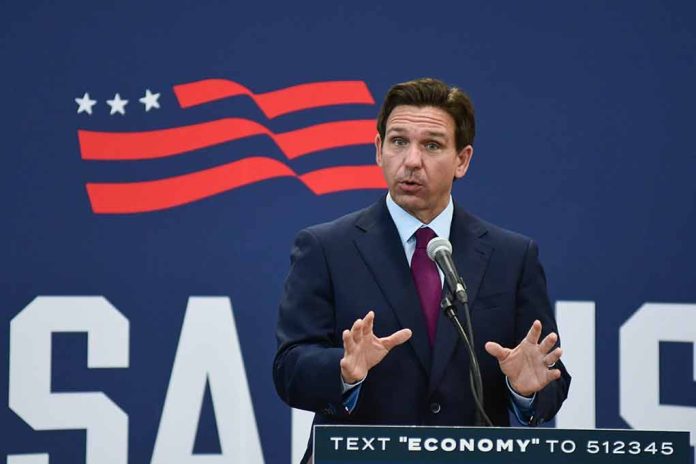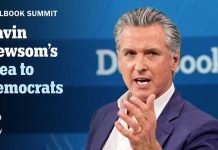
Florida Governor Ron DeSantis calls for a special legislative session to implement President-elect Trump’s immigration policies, sparking controversy and opposition from within his own party.
At a Glance
- DeSantis announces special session starting January 27 to align with Trump’s immigration agenda
- Republican legislative leaders oppose the session, calling it “premature” and “irresponsible”
- Session aims to empower state and local governments to combat illegal immigration
- Proposal includes potential activation of Florida National Guard for immigration enforcement
- Critics argue the session is unnecessary and may harm key Florida industries
DeSantis Pushes for Immigration Crackdown
Florida Governor Ron DeSantis has announced a special legislative session to begin on January 27, just a week after President-elect Donald Trump’s inauguration. The session aims to align Florida’s immigration policies with the anticipated federal changes under the new administration. DeSantis’s move signals a strong commitment to supporting Trump’s hardline stance on immigration, potentially setting Florida apart as a leader in state-level immigration enforcement.
The governor’s decision to call for a special session underscores the urgency he perceives in addressing immigration issues. DeSantis plans to introduce legislation that would impose additional duties on local officials and provide necessary funding for enhanced immigration enforcement efforts. This could include allocating tens of millions of dollars to expand state immigration enforcement and detention capabilities.
President-elect Trump was elected with a mandate to stop illegal immigration and deport illegal aliens already in our country.
State and local officials in Florida will actively facilitate the Trump Administration’s policies against illegal immigration, and to do that we need to… pic.twitter.com/PHvNYvjAH6
— Ron DeSantis (@GovRonDeSantis) January 13, 2025
Republican Opposition and Criticism
Despite DeSantis’s push for immediate action, the governor faces significant opposition from within his own party. Republican legislative leaders, including Florida House Speaker Daniel Perez and Senate President Ben Albritton, have pushed back against the call for a special session, labeling it “premature” and “irresponsible.” They argue that acting without specific guidance from the Trump administration could potentially hinder the new president’s efforts to address illegal immigration.
“It is completely irresponsible to get out ahead of any announcements President Trump will make, especially when uninformed or ill-timed state action could potentially impair or impede the success of President Trump’s forthcoming efforts to end illegal immigration, close our borders and protect the sovereignty of our nation” – Florida House Speaker Daniel Perez and Senate President Ben Albritton
The legislative leaders emphasize that the regular session, set to begin in March, would be a more appropriate time to address immigration and other pressing issues. They also criticize DeSantis for presenting only “fragments of ideas” without detailed legislative proposals, suggesting that the special session lacks the necessary preparation and specificity typically required for such proceedings.
Potential Impacts and Concerns
DeSantis’s proposed measures include the possibility of activating the Florida National Guard and State Guard to assist in enforcing federal immigration laws. This unprecedented step would significantly expand the state’s role in immigration enforcement, traditionally a federal responsibility. Critics argue that such actions could have far-reaching consequences for Florida’s economy, particularly in sectors heavily reliant on immigrant labor such as agriculture, construction, and tourism.
“We have a responsibility to be in this fight,” DeSantis argued.
The governor has also hinted at repealing a 2014 law that grants in-state tuition to undocumented immigrants, a move that could affect thousands of students in Florida. Additionally, DeSantis has warned of suspending officials who neglect their duties in enforcing immigration laws, potentially creating tension between state and local governments.
Florida Gov. Ron DeSantis is calling state lawmakers into a special session to help carry out President-elect Donald Trump’s promises for a swift crackdown on immigration. https://t.co/8SHdFpn5hq
— WSVN 7 News (@wsvn) January 13, 2025
Contrasting Approaches: Florida vs. California
DeSantis’s aggressive stance on immigration stands in stark contrast to the approach taken by California Governor Gavin Newsom. While Florida prepares to align closely with Trump’s policies, California is gearing up to resist potential federal actions that could impact its immigrant communities. Newsom has convened sessions to prepare for legal challenges against Trump’s policies and has pledged to protect vulnerable migrant populations within his state.
“We will work with the incoming administration and we want President Trump to succeed in serving all Americans. But when there is overreach, when lives are threatened, when rights and freedoms are targeted, we will take action,” Newsom said in a December statement.
As the special session approaches, all eyes will be on Florida to see how this bold move by Governor DeSantis unfolds and what implications it may have for both state and national immigration policies. The outcome could set a precedent for other states considering similar measures and potentially reshape the landscape of immigration enforcement across the country.
Sources:
- DeSantis calls for special legislative session to implement Trump’s immigration crackdown in Florida
- Gov. DeSantis’ call for special session on immigration is unwarranted | Editorial
- DeSantis calls special session to implement Trump’s immigration policies | ABC27
- Florida legislative leaders push back on DeSantis’ call for special session on immigration – CBS Miami














